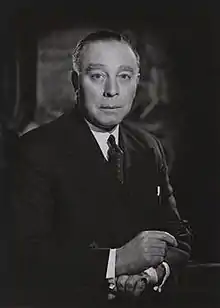Leslie Alfred Charles Fry
Sir Leslie Alfred Charles Fry KCMG OBE (17 April 1908 – 21 October 1976) was a British diplomat, who served as Ambassador to Hungary, Indonesia and Brazil.[1] He was awarded Grand Cross of the Order of the Southern Cross by the Government of Brazil. When the Soviet Union invaded Hungary in 1956 to repress the Hungarian Revolution, he opened the doors of the British embassy to Hungarian refugees, receiving a knighthood the following year.
Sir Leslie Fry | |
|---|---|
 | |
| United Kingdom Ambassador to Hungary | |
| In office 1955–1959 | |
| Preceded by | Sir George Labouchère |
| Succeeded by | Sir Ivor Pink |
| United Kingdom Ambassador to Indonesia | |
| In office 1959–1963 | |
| Preceded by | Dermot MacDermot |
| Succeeded by | Sir Andrew Gilchrist |
| United Kingdom Ambassador to Brazil | |
| In office 1963–1966 | |
| Preceded by | Sir Geoffrey Wallinger |
| Succeeded by | Sir John Russell |
| Personal details | |
| Born | 17 April 1908 |
| Died | 21 October 1976 (aged 68) |
| Nationality | British |
| Education | Royal Masonic School, Royal Military Academy Sandhurst |
| Profession | Diplomat and ambassador |
| Awards | KCMG |
Life
Leslie "Bunny" Fry was born in 1908 in Monmouthshire, Wales and christened in Jammu and Kashmir.
Fry's parents were Florence Rose Fry (née Stokes, 1882–1918) and Alfred Andrew Fry MBE (1870–1919).[2] Leslie Fry's father was a Freemason[3] who prior to World War I had served in the South Wales Borderers as a Lieutenant and Quartermaster, Monmouthshire Regiment, 3rd Battalion, and during World War I as both a captain in the British Army, Monmouthshire Regiment, 3rd Battalion (Territorial) and a lieutenant in the Royal Air Force, 12th Wing.
Fry attended the Royal Masonic School and later graduated from the Royal Military Academy Sandhurst.[4]
Fry's first wife was Mary Cuerden, from whom he separated and remarried. Mary Cuerden's second husband was Captain Basil Gerritsen Ivory, formerly of the Special Operations Executive and director of the investment trust British Assets Trust Limited. Fry's second wife was Marian Bentley, whom he married in 1954.
British Army career
Fry joined the British Army in India from 1928. On 2 February 1928, he was promoted to Second Lieutenant, Indian Army.[5] In 1933, he transferred to the Indian Political Service. Between 1941 and 1944, he served as Undersecretary of the Government of India in the Ministry of Foreign Affairs. In 1946, he became Deputy Secretary of the Government of India in the Ministry of Foreign Affairs.
Diplomatic career
.jpg.webp)
Arquivo Público do Estado de São Paulo.
On 23 June 1947, Fry joined His Majesty's Foreign Service at the Seventh Grade[6][7] listed alongside his cousin, Robert Morton Saner OBE. On 30 October 1947, Fry transferred from the Indian Civil Service to the Foreign Office.[8] From 1951 to 1953, he served as Minister-Counsellor in Lisbon. Between 1953 and 1955, he was Head of the Foreign Office's Eastern Department.
On 24 October 1955, he was appointed Her Majesty's Envoy Extraordinary and Minister Plenipotentiary to Hungary.[9] On 11 February 1959, he was ambassador to Indonesia.[10] On 16 June 1963, he replaced Geoffrey Wallinger as ambassador to Brazil.[11]
Fry retired in 1966 and returned to Britain.
Awards and honours
- 1 January 1944 awarded MBE[12] when serving in the Indian Political Service as "Under Secretary to the Government of India in the External Affairs Department"
- 14 August 1947 awarded OBE[13] when "Deputy Secretary to the Government of India in the External Affairs and Commonwealth Relations Department"
- 9 June 1955 awarded CMG[14]
- 13 June 1957 awarded KCMG[15]
Bibliography
Fry's memoirs, published in 1978:
- Fry, Leslie (1 January 1978). As Luck Would Have It: A Memoir (UK ed.). London: Phillimore & Company. ISBN 9780850333145.
References
- "Fry, Major Sir Leslie Alfred Charles". WHO'S WHO & WHO WAS WHO. Oxford University Press. December 2007. doi:10.1093/ww/9780199540884.013.U154651. Retrieved 20 October 2018.
- Alfred Andrew Fry on Lives of the First World War
- Library and Museum of Freemasonry; London, England; Freemasonry Membership Registers; Description: Membership Registers: Country K 816–940 to Country L 941–1013; Reel Number: 13
- Great Britain. Foreign Office (1963). The Foreign Office List and Diplomatic and Consular Year Book. Harrison and Sons. p. 212. Retrieved 20 October 2018.
- "No. 33510". The London Gazette. 28 June 1929.
- "No. 38534". The London Gazette. 8 February 1949.
- Gerhard Besier (25 November 2015). 'Intimately Associated for Many Years': George K. A. Bell's and Willem A. Visser 't Hooft's Common Life-Work in the Service of the Church Universal – Mirrored in their Correspondence (Part Two 1950–1958). Cambridge Scholars Publishing. p. 1070. ISBN 978-1-4438-8625-3. Retrieved 20 October 2018.
- "No. 38148". The London Gazette. 16 December 1947.
- Chris Cook (2 October 2012). The Routledge Guide to British Political Archives: Sources since 1945. Routledge. p. 76. ISBN 978-1-136-50961-2. Retrieved 20 October 2018.
- "No. 41676". The London Gazette. 7 April 1959.
- "No. 43093". The London Gazette. 27 August 1963.
- "No. 36309". The London Gazette. 1 January 1944.
- "No. 38161". The London Gazette. 30 December 1947.
- "No. 40497". The London Gazette. 9 June 1955.
- "No. 41089". The London Gazette. 13 June 1957.